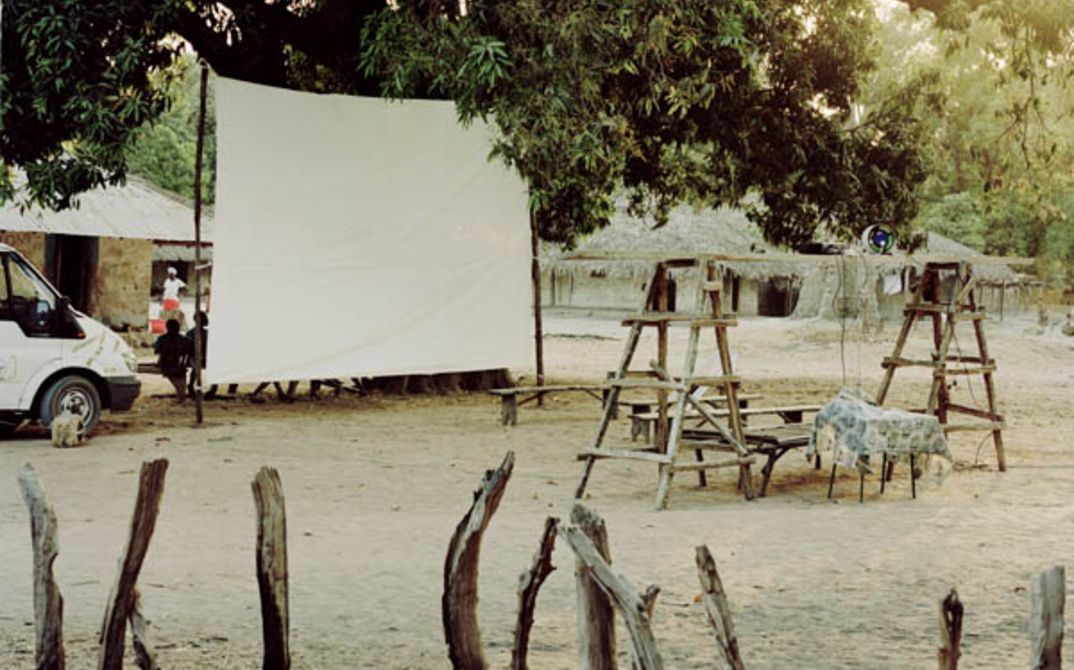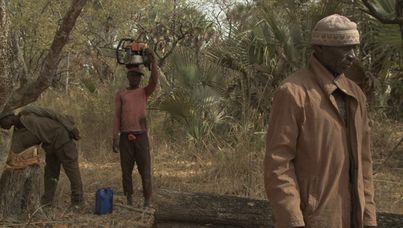
From Boé to Berlin
A mobile lab on the film history of Guinea-Bissau
The project "From Boé to Berlin" is dedicated to the recently re-opened and now partly digitized archival holdings of the national film institute of Guinea-Bissau (INCA – Instituto Nacional de Cinema e Audiovisual). It will serve to make the films visible again, experimenting with various formats: mobile cinema, moderated film program, exhibition, and workshop. The project provides an opportunity to carry out a translocal case study in which the subsidiary function of an institution such as Arsenal in securing and giving new visibility to African archives comes to the fore.
As part of her ongoing project "Luta ca caba inda" ("The Struggle is Not Over Yet"), Portuguese artist and Berlin resident Filipa César has sought to make available, secure and give new visibility to a unique corpus of films: the archival holdings of the National Film Institute of Guinea-Bissau (see also "Animated Archive"), only some of which have survived intact. These holdings attest to an intensive phase of documentary film and cinema work in the 1970s, a timeframe that encompasses the struggle for liberation from colonial forces and the country’s decolonization. Still under the aegis of charismatic liberation fighter Amílcar Cabral, it was here that Guinea-Bissau’s independent cinema came into being, which was soon to be forgotten again by film historiography – despite it having received prominent worldwide support at the time and two of the filmmakers Flora Gomes and Sana na N'Hada involved going on to receive international attention for their feature films.
During the digitization process, which was attended variously by filmmakers Sana na N'Hada and Suleimane Biai as well as the then head of INCA Carlos Vaz, the question arose as to how this newly secured material could be used in the future. The archive lends itself to a geopolitical reading on the one hand, as the films found there relate to a practice of cinematic solidarity during a period of huge political upheaval. They reveal production conditions, illuminate the special role played by Cuba and the neighboring country of Guinea-Conakry during the era of decolonization and leave their mark in the biographies of a diverse range of witnesses from the time, including filmmakers Chris Marker, Sarah Maldoror and Jean Rouch, Swedish journalists Rudi Spee and Lennart Malmer, singer Miriam Makeba and editor Anita Fernandez. On the other hand, the material’s historical significance and the fact that it fills a gap in the collective visual history of Guinea-Bissau also gives rise to another goal: providing visibility for the film material and returning it to the center of cultural discourse in Guinea-Bissau.
Mobile Cinema Revisited
The mobile cinema format is linked to a practice already introduced in various colonial African countries before being taken up again in the post-colonial context, including in Guinea-Bissau, under new auspices. Sana na N'Hada was himself involved in attempts to organize a mobile cinema at the end of the 1970s to show the films and newsreels being produced at the time. The project was based around the Cuban model of a “Departamento de Divulgación Cinematográfica” and was supposed to overcome the rural population’s enforced immobility due to agricultural work and make a contribution towards communication and the creation of knowledge within the heterogeneous state entity. Such attempts soon failed however due to a lack of funding.
Today, film screenings in Guinea-Bissau mostly take place at private and semi-public locations and draw on the DVD market. Films thus reach their audiences via informal means. A traveling cinema equipped with mobile technology which goes directly to its audiences thus links both to the past practice of communicating culture via film as well as to the formats of shared film watching common today. Equipped with the visual and sound holdings of the INCA archive, the mobile cinema will start in the Boé region, where the independent state of Guinea-Bissau was proclaimed in September 1973 while the war of independence was still raging – an event of great symbolic importance which equally marked the start of international image production about Guinea-Bissau’s successive liberation. Some of the mobile cinema’s other stops include Bafatá, the birthplace of Amílcar Cabral, and the island of Galinhas, where the biggest prison for political prisoners was located during the colonial period.
The experiences with the mobile cinema will be jointly documented by Filipa César, Suleimane Biai and Sana na N’Hada and presented at the conclusion of Visionary Archive in May 2015. Before the actual trip, a workshop will be held for those involved so that agreement can be reached about the significance of the project and which forms should be used to document it.
